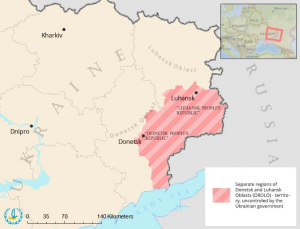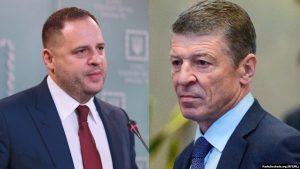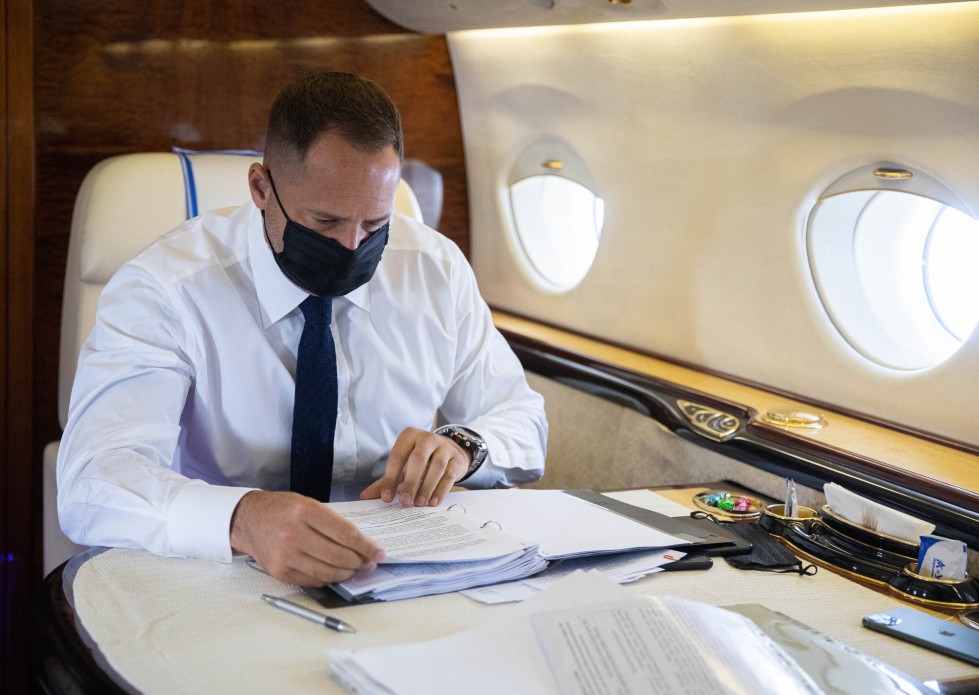Nine months have passed since the last summit in the Normandy Four (N4) format in Paris, when the leaders of Ukraine, Russia, Germany, and France resumed peace negotiations regarding Ukraine's war-torn Donbas region, where Russia occupies substantial parts of Luhansk and Donetsk oblasts.
This time, on 11 September, political advisors of the Normandy Four leaders met in Berlin. The formal head of the Ukrainian delegation was Oleksiy Reznikov, the country's vice PM and minister for the reintegration of the temporarily occupied territories. However, when it comes to the Donbas negotiations with Russia, President Volodymyr Zelenskyy's top gun is Andriy Yermak, head of the President's Office. The chief Russian negotiator was Dmitry Kozak
, deputy head of President Putin’s administration and supervisor of the Kremlin's policies toward Ukraine. After seven hours of talks, Yermak and Kozak made conflicting statements regarding the results.
Here we publish an abridged translation of an article by Maria Zolkina, an analyst with one of the major Ukrainian pollsters, that scrutinizes the points made by the officials and analyzes how Russia and Ukraine act in the negotiation process and what we can expect in the future.

The long-awaited meeting of advisers to the Normandy Four leaders in Berlin not only failed to lead to any breakthroughs [in the Russia-Ukraine talks on the war in the east of Ukraine, - Ed.] but also became a disappointment of sorts for both Kyiv and Moscow.
The negotiation positions of Ukraine and Russia are increasingly diverging, leaving Ukraine almost no room for maneuver and compromise with Russia, even having a substantial desire for "peace" [in the Donbas advocated by President Volodymyr Zelenskyy], and Ukraine's "Plan B" to revise the talks is becoming increasingly realistic.
What risks could it bring to Ukraine? And how can Kyiv avoid falling into Russian traps?
What did they (not) agree on?

Extending the regime of the ceasefire in the Donbas region is basically the only agreement reached in Berlin.
However, it was not backed by any additional guarantees, and therefore could be violated at any time, as Russia did before. The ceasefire is an exclusively political tool for Moscow to press on Kyiv with demands to start implementing the political clauses of the Minsk accords [namely - the issue of enshrining a "special status" in Ukraine's Constitution and holding elections in the currently occupied territories before Ukraine gains control of the area; Ukraine views these two clauses of the Minsk agreements as unacceptable while implementing them is a cornerstone for Russia - Ed.].
Without progress in political compromises there will be no ceasefire.
Moreover, the obviously flawed mechanism of implementing the ceasefire with a blurred role of the JCCC, which now has only Ukrainian representatives, wasn’t improved at the meeting. That’s why the exact way to monitor the ceasefire remains an open question.
The Russian and Ukrainian sides send completely opposite signals as to amending the resolution of the Verkhovna Rada of Ukraine (Parliament) on local elections in Ukraine on 25 October.
The Kremlin’s representative Dmitry Kozak states that the Rada is going to consider the draft amendment to the resolution in the near future, while his Ukrainian counterpart, Andriy Yermak, denies the existence of such an agreement point and says that there is only some a draft amendment of some MP, although none is available online on the Parliament's website at the moment.
Russia is focusing on this resolution solely to have the option of blocking the negotiations when its whims would be ignored, or, if they succeed, to show off how successful its pressure on Kyiv would have been.
However, there is almost no chance of adopting such changes to the election resolution, as even the pro-presidential Servant of the People faction is not ready to vote for it. And, in the end, everyone understands that even its adoption would not bring the elections in the occupied territories any closer.
No progress
One of the key issues for Ukraine and for President Zelenskyy personally, a new stage for exchanging prisoners, was left without an answer.
As well, some tactical things -- demining the territory and opening new entry-exit checkpoints -- were agreed at the previous Minsk TCG talks.
Even less agreement between the sides exists on Volodymyr Zelenskyy’s top priority issue of planning a new summit of the leaders of the Normandy Four.
Despite Yermak's rather optimistic forecasts, it’s not on the agenda.
The Kremlin’s reaction to Kyiv's enthusiasm is not just cold but even jeering.
Note Kozak's statement that for one of the parties (obviously, Ukraine) the meeting with Putin is an end in itself. Meanwhile, there actually is no real reason to meet.
The bottom line is that both delegations returned home from the negotiations without any serious gains.
However, while the Ukrainian side lacks mechanisms to achieve its goals, the Russians may certainly involve pressure, blackmailing to break the new ceasefire.
Russian tactics of "small steps"
For Zelenskyy and his team, this period is quite difficult. There is no reason to agree to a political settlement yet, but Russia will demand to satisfy its appetites to keep the ceasefire running.
The joint inspection near the town of Shumy [in the free Ukrainian territory together with representatives of Russia’s occupation administration, - Ed.], which was disrupted
on 10 September, is one of such dangerous "grassroots" initiatives coming from the Russians. Thus, Russia is obviously going to try to use the ceasefire regime for maximizing the legitimacy of the representatives of its illegal armed formations as a "second party" for contacts with the Ukrainian Armed Forces.
The key goal of the Russians in organizing this inspection was to bring the so-called "DNR Mission to the JCCC" in from the cold, so that its "chief" would review the positions of Ukraine’s Armed Forces and, as Russia further demanded, signing a protocol of the inspection.
And in the protocol, without a doubt, the signature of that "official" should have appeared next to the Ukrainian representative’s signature.
And there is no doubt: along with diplomatic pressure in the Normandy Format, similar "initiatives" will be actively promoted in the Minsk TCG.
Today, the Kremlin does not care much about the format of this direct dialog [between Ukraine and Russian occupation administrations in the Donbas], it is interested in the very fact of at least some direct contacts of this kind. Preferably, when the dialog is enshrined in a signed document.
This tactic of "small steps" is based on a number of mistakes made by the Ukrainian side earlier, especially at the stage of the 2019 disengagement of forces and troops [in three zones on the front-line].
The mistakes occurred when the President's Office turned a blind eye to the presence of the pseudorepublics' non-existent "JCCC" in the disengagement areas, while the OSCE SMM representatives were not physically allowed to inspect the old and new positions of militants in these areas.

Plans remain for further inspections where Russia will suggest the fake "authorized representatives" of the JCCC instead of official Russian representatives. The risks that this carries is obvious.
The future of the Minsk accords
Despite Kyiv officially confirming its commitment to the Minsk deal, it is becoming increasingly more apparent even to its largest proponents in Zelenskyy's circle that the deal is impossible to implement it in its current form.
Whether the President's Office likes it or not, but responding with concessions to Russia’s blackmail and pressure would be political suicide.
However, while Ukrainian negotiators manage to fend off the Kremlin’s most brazen demands, their ability to see the risks of such “single initiatives” as joint inspections is markedly worse.
The idea to revise and update the Minsk accords has been increasingly floated on the sidelines of the talks. But, in parallel with political pressure on Ukraine, the Kremlin is already openly demanding to abandon the very rhetoric of a possible update to the Minsk documents.
And, in fact, this may be the Kremlin's game for who will be blamed as the "guilty party" for disrupting the implementation of the Minsk peace accords.
If Moscow does not receive guarantees for its settlement scenario [with the legalization of its pseudo-statelets in Ukraine's political field through amendments to Ukraine's Constitution and premature local elections - Ed], it will not seek not a constructive compromise with Kyiv, but rather an excuse to suspend active negotiations -- de-facto, freezing the conflict -- while making Ukraine responsible for Russia’s own actions.
This may be the reason Russia is so actively blaming Kyiv for the idea of revising the Minsk accords, in order to accuse Ukraine of "disrupting" the process and moving away from the Minsk matrix.
Kyiv understands these Russian plans but has no decision on finding a way out of the situation.
Ukrainian President Zelenskyy is not ready to refuse further attempts of finding a compromise with Russia. Following Russia's scenario does not seem possible, because of resistance within Ukrainian society, and because of a lack of guarantees from Russia.
The worst prospect of going around in a circle shapes up for Volodymyr Zelenskyy. But this situation cannot last for long.
Russia's chosen course of action does not guarantee its success. On the contrary, Ukraine’s idea of updating the Minsk accords attracts more and more attention, and today won't be considered as pulling out from them: after all of Ukraine's attempts to establish a dialogue with Russia, Ukraine would look more constructive with this idea.
Therefore, Ukraine is left with preparing further informational and political grounds for giving proposals to amend the Minsk deal.
Read more:
- Planned inspection of Ukrainian positions by Russian-controlled forces sparks protests
- Ukraine remains committed to ceasefire in Donbas despite flareup taking life of one soldier
- Ukraine’s new Donbas negotiators wreak havoc with pro-Russian statements
- Conflict conservation in Ukraine’s east follows the Transnistria model
- Ukrainian President Zelenskyy appoints gerontocrats to negotiate with Russia in Minsk
- The quick way to quasi-recognition of Donetsk-Luhansk’s armed formations: a play-by-play account
- Kozak celebrates diplomatic victory over Ukraine in rude letter to Normandy Forum
- Kozak-Yermak plan on Donbas: The fine print
- Shady agreements legitimizing Russia’s puppet “republics” likely signed in Minsk
- Kyiv finds an alibi to step back from Kozak-Yermak plan on Donbas

